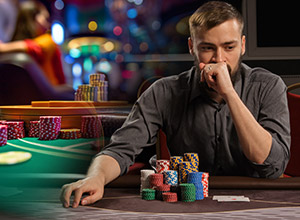It’s 2024 and if you’re not playing roulette—what are you waiting for? It’s one of the most internationally beloved games of all time. However, before you start, it’s highly worth it to think about whether roulette really resonates with your gaming preferences.
This goes beyond the game itself – it’s about understanding your personal playstyle.
Are you someone who relishes the unpredictable nature of chance, finding joy in the unpredictability of each spin? Or maybe you lean towards a more calculated and strategic approach, seeking patterns and trends within the game. With Roulette, anything’s possible.
So, take a moment to introspect, consider, and ask yourself the 20 questions leading to a final answer: Is playing roulette really right for you? Let’s dive into the characteristics that define the right kind of person to fully embrace the roulette experience.
A Brief History of a Beloved Classic
The origins of roulette trace back to 17th-century France, where the brilliant mathematician Blaise Pascal created an early version while attempting to create perpetual motion.
Roulette’s early wheels featured both single and double zeros, with the first official roulette wheel making its appearance in 1842 at a Parisian casino. It showed the numbers 1 through 36, alongside the single and double zeros that added an extra layer of excitement to the game.
The Blanc brothers, Francois and Louis, played a pivotal role in shaping roulette in the mid-19th century. Introducing the single-zero wheel in Monte Carlo, they not only reduced the house edge but also developed European roulette, a version that gained immense popularity.
As roulette made its way to the United States in the late 19th century, casinos sought to increase their advantage. The introduction of the double-zero wheel created American roulette, which became the standard version in the U.S.
The 20th century witnessed the continued evolution of roulette, with variations such as mini-roulette and no-zero roulette catering to diverse player preferences. The game’s popularity soared globally, becoming a staple in casinos worldwide.
With the internet revolutionizing the way we experience games, roulette found its virtual niche in online casinos. Players could now enjoy the thrill of the wheel from the comfort of their homes.
The concept of live dealer roulette emerged as technology advanced, offering a bridge between online convenience and the authentic casino atmosphere. Real-time video streaming of a human dealer spinning the wheel added a new dimension to the virtual gaming experience.
In recent years, roulette has embraced modern innovations. Mobile gaming has made it accessible on smartphones, while advanced graphics and animations enhance the overall enjoyment. Understanding the historical journey of roulette unveils the roots and development of a game that continues to captivate players worldwide.
How Do You Play?
 If you’re new to the roulette table, never fear – the game is straightforward with a few nuances that are easily graspable.
If you’re new to the roulette table, never fear – the game is straightforward with a few nuances that are easily graspable.
At its core, roulette features a spinning wheel adorned with numbered pockets and a small, elusive ball. Your mission is to predict where the ball will find its resting place when the wheel comes to a halt. The numbered pockets span from 1 to 36, with an additional green pocket designated for 0 (and 00 in American roulette).
The heart of roulette lies in the art of betting. Players can place bets on specific numbers, groups of numbers, or even colors. If the ball lands on a number or color you’ve staked your wager on, you emerge victorious. It truly is as straightforward as that. Keep in mind that riskier bets come with the potential higher potential payouts.
Understanding the distinctions between the two primary types of roulette wheels is crucial. European and French roulette wheels consist of 37 pockets, including a single green zero. Conversely, American roulette wheels comprise 38 pockets, introducing both 0 and 00. This subtle difference significantly impacts the odds and house edge, influencing your decision when selecting a game.
As you approach the table, keep all the betting option sin mind. ‘Inside bets’ involve wagering on specific numbers or small groups of adjacent numbers, providing higher payouts but at the cost of lower odds. On the other hand, ‘outside bets’ cover broader groups of numbers, offering increased chances of winning, albeit with slightly lower payouts.
Once your bets are in place, the dealer initiates the spin, setting the ball on its mesmerizing journey around the wheel. The anticipation builds as the wheel gradually decelerates, and the ball pirouettes across the pockets. The moment of truth arrives as the wheel halts, determining the winners and orchestrating the distribution of payouts.
It’s essential to recognize that roulette is a game of chance, and while strategies such as the Martingale or Labouchere can help manage wagers, there are no foolproof methods for consistent victories.
The chances also vary by, well, variant. There are some wild roulette variations out there. In addition to the classic European and American versions, there are enticing variations like French roulette, which employs unique rules such as “La Partage” and “En Prison.” Mini-roulette further condenses the traditional game into a smaller format, offering a quicker pace for those seeking a different tempo.
Are You the Right Person to Play?
There’s a certain thrill-seeker personality that finds solace in the unpredictable nature of roulette. These players embrace the uncertainties, finding excitement in the spin of the wheel and the anticipation of where the ball might land. They possess a resilient mindset, capable of handling both wins and losses with a sense of detachment, recognizing the inherent unpredictability of the game.
On the flip side, individuals who find it challenging to cope with uncertainty and are adverse to risk might want to tread a little more cautiously. The fast-paced nature of the game and the potential for both exhilarating wins and disappointing losses can be overwhelming for those who prefer more predictability in their entertainment.
Psychology plays a seriously underrated, crucial role in a player’s experience at the roulette table. Those with a strategic mindset may enjoy developing and testing betting strategies, seeking patterns in the game’s outcomes. This analytical approach can add an extra layer of engagement for players who enjoy deciphering the game’s nuances.
Neurologically, the thrill of a win triggers a release of dopamine in the brain, creating a sense of pleasure and reward. However, understanding the neurological response to winning is equally important as acknowledging the impact of losses. For some, losses can lead to a negative emotional response, influencing decision-making and potentially encouraging risky behavior in an attempt to recoup losses quickly.
It’s essential for players to maintain a healthy relationship with the game, recognizing that luck is a significant factor in roulette. Those who can appreciate the game for what it is, balancing the highs and lows without succumbing to impulsive behavior, are better suited to enjoy the roulette experience.
Staying Healthy While Playing
 Let’s get into that healthy mindset. One key aspect of enjoying the game is maintaining your mental well-being and keeping your finances in check.
Let’s get into that healthy mindset. One key aspect of enjoying the game is maintaining your mental well-being and keeping your finances in check.
When you’re at the roulette table, it’s easy to get caught up in the excitement of the spin and the anticipation of where the ball will land. However, it’s crucial to approach the game with a clear mind. Set realistic expectations and remember that, at its core, roulette is a game of chance.
Developing and sticking to a basic budget is a smart strategy to ensure that your roulette sessions remain enjoyable without risking financial strain. Determine the amount you’re comfortable spending and stick to it. Treat it as entertainment rather than an investment, and avoid chasing losses to prevent potential stress and frustration.
Another aspect of maintaining mental health during roulette play is to take breaks. Whether you’re playing at a physical casino or online, stepping away from the table periodically can help refresh your mind and keep you from making impulsive decisions.
It’s also a good idea to be aware of how the game affects your emotions. Winning can be exhilarating, but it’s essential not to let it cloud your judgment. Similarly, experiencing losses can be disheartening, so it’s crucial to maintain a positive attitude and not let setbacks impact your overall well-being.
Consider roulette as a form of entertainment that adds excitement to your life rather than a strategy to make money. By approaching the game with a healthy mindset and adhering to a budget, you can enjoy the thrill of the spin responsibly. Remember, the goal is to have fun, so ensure that your roulette experience contributes positively to your overall mental and financial well-being.
Tips and Tricks
Last, here are some systems you may encounter—and that may help you hit it big.
One well-known strategy is the Martingale system. This involves doubling your bet after each loss, aiming to recover previous losses and make a profit when a win occurs. The Fibonacci sequence, a series of numbers where each number is the sum of the two preceding ones, is the basis of another betting strategy.
The D’Alembert system is a more conservative strategy, involving adjusting bets based on wins and losses. After each loss, players increase their bet by one unit, and after each win, they decrease it by one unit. This method aims for a balance between risk and reward.
Responsible Roulette play often involves observing the game and being patient. Some players look for patterns in the outcomes or “hot” and “cold” numbers, while others prefer waiting for a certain number of spins before placing their bets. Developing your own observational style can be a valuable asset.
